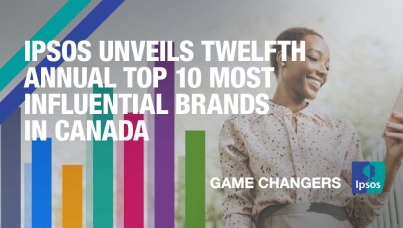Six in Ten Parents (61%) Want to Give Their Child the Ability to Select Own TV Programming, But Most Worry about
Content (67%) and Advertising (76%)
In fact, six in ten (58%) `agree' (22% strongly/36% somewhat) that they worry about what their children are watching when they are watching TV on their own, and a similar proportion (60%) `agree' (22% strongly/38% somewhat) that they worry about what their children watch when they're with their friends - especially true among those with kids aged 8 to 10 (67%). Parents say that, on average, their children watch 69 minutes of TV on their own each day, without any adult supervision, increasing to 85 minutes a day, on average, among those with kids aged 11 or 12. Interestingly, fathers report an average of 84 minutes, overall, compared to mothers who say it's only 63 minutes per day. The average parent spends 7 hours per week watching TV or movies with their child.
Four in ten (42%) parents say that their child has accidentally been exposed to something on TV that has scared them (rising to 52% among parents of 11-12 year olds), and four in ten (40%) say their child has seen commercials that were not suitable for them. Two in ten (21%) indicate that their child has seen a 14A, 18A or PG rated film without an adult present (13+, 16+ or 18+ in Quebec), and a similar proportion (20%) says their child has seen something on TV that has given them a nightmare. One in twenty (5%) say their child has seen an R-rated film without an adult present, including 16% of 11-12 year olds. Just four in ten (37%) say their kids haven't had any of these experiences.
Thinking about the things that are important to them when watching TV with their child:
- Nine in ten (89%) say it's important (38% very/51% somewhat) to be able to choose from a large selection of programming.
- Nine in ten (86%) believe it's important (29% very/57% somewhat) to be able to let their children select the TV shows and movies that they watch together.
- Most (83%) say it's important (38% very/46% somewhat) to be able to watch a TV show or movie without commercial interruptions.
- Eight in ten (77%) say it's important (30% very/46% somewhat) to have the flexibility of watching shows when they want to watch them, and not be restricted by traditional scheduling.
- Three quarters (76%) indicate it's important (31% very/45% somewhat) to have the option of giving their child a break between shows rather than watching them back to back.
- Four in ten (36%) think it's important (13% very/24% somewhat) to have the flexibility to move from one room to the other when watching something.
Eight in ten (79%) parents say that they let their child choose the programming they want to watch. Among those that do, seven in ten (72%) say their child typically asks for the name of a TV show or movie, and one in three (34%) say their child typically references a character in the TV show or movie. One in ten (11%) use some other tactic.
When it comes to selecting programming for their child, most (95%) say it's important (54% very/41% somewhat) that the programming has educational value, while others say having the program available when their child wants to watch TV is important (83% -- 33% very/50% somewhat), that having limited commercials or advertising is important (80% -- 33% very/47% somewhat), followed by the length of the show/movie (76% -- 23% very/53% somewhat), and the ability for their child to change programming on their own (63% -- 21% very/43% somewhat).
A majority (54%) of Canadian parents amid that they often (7% all the time/47% sometimes) find themselves watching children's programming even when their child is not in the room. Three in ten (30%) say this rarely happens, while only 16% insist that it never happens. Parents living in Atlantic Canada (65%) are most likely to say they often watch children's programming without their children, followed by those living in Alberta (57%), Ontario (56%), British Columbia (54%), Saskatchewan and Manitoba (49%) and Quebec (48%).
These are some of the findings of an Ipsos Reid poll conducted between March 20-23, 2012, on behalf of Netflix. For this survey, a sample of 1,013 parents of children aged 12 and under from Ipsos' Canadian online panel was interviewed online. Weighting was then employed to balance demographics to ensure that the sample's composition reflects that of the adult population according to Census data and to provide results intended to approximate the sample universe. A survey with an unweighted probability sample of this size and a 100% response rate would have an estimated margin of error of +/- 3.1 percentage points, 19 times out of 20, of what the results would have been had the entire population of parents in Canada been polled. All sample surveys and polls may be subject to other sources of error, including, but not limited to coverage error and measurement error.
For more information on this news release, please contact:
Sean Simpson
Associate Vice President
Ipsos Reid
Public Affairs
416.572.4474
[email protected]
About Ipsos Reid
Ipsos Reid is Canada's market intelligence leader, the country's leading provider of public opinion research, and research partner for loyalty and forecasting and modelling insights. With operations in eight cities, Ipsos Reid employs more than 600 research professionals and support staff in Canada. The company has the biggest network of telephone call centres in the country, as well as the largest pre-recruited household and online panels. Ipsos Reid's marketing research and public affairs practices offer the premier suite of research vehicles in Canada, all of which provide clients with actionable and relevant information. Staffed with seasoned research consultants with extensive industry-specific backgrounds, Ipsos Reid offers syndicated information or custom solutions across key sectors of the Canadian economy, including consumer packaged goods, financial services, automotive, retail, and technology & telecommunications. Ipsos Reid is an Ipsos company, a leading global survey-based market research group.
To learn more, please visit www.ipsos.ca.
About Ipsos
Ipsos is an independent market research company controlled and managed by research professionals. Founded in France in 1975, Ipsos has grown into a worldwide research group with a strong presence in all key markets. In October 2011 Ipsos completed the acquisition of Synovate. The combination forms the world's third largest market research company.
With offices in 84 countries, Ipsos delivers insightful expertise across six research specializations: advertising, customer loyalty, marketing, media, public affairs research, and survey management.
Ipsos researchers assess market potential and interpret market trends. They develop and build brands. They help clients build long-term relationships with their customers. They test advertising and study audience responses to various media and they measure public opinion around the globe.
Ipsos has been listed on the Paris Stock Exchange since 1999 and generated global revenues of e1,363 billion (1.897 billion USD) in 2011.
Visit www.ipsos-na.com to learn more about Ipsos' offerings and capabilities.



